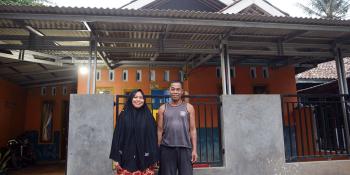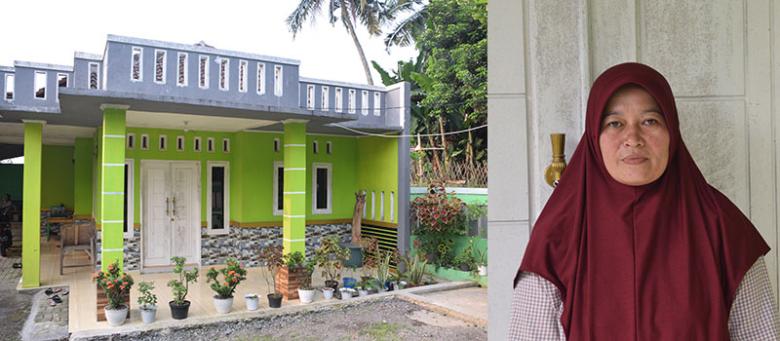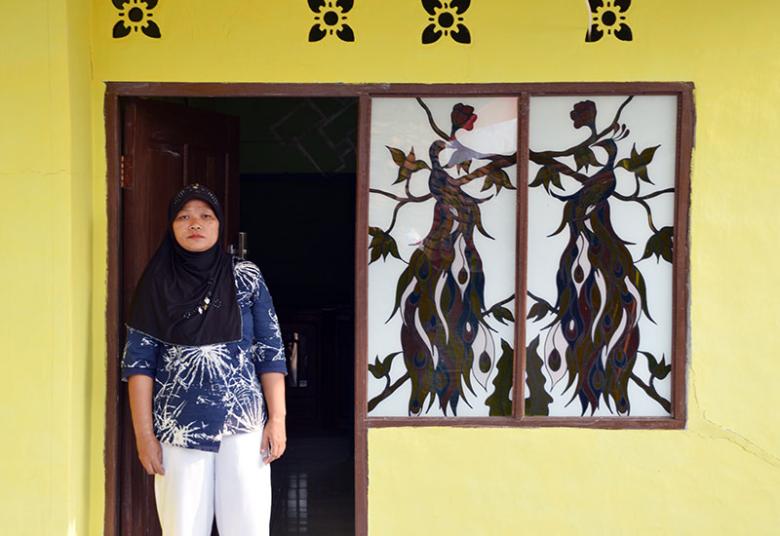
We did it!
With access to housing microfinance, Sani and Ace finally built their home. Learn how Habitat's partnership with Indonesian microfinance institution KOMIDA changes lives.
WEST JAVA, Indonesia, Feb. 23, 2023 — In Indonesia, the world’s fourth most populous country, 22 million households — one in three persons — live in homes with at least one substandard feature such as overcrowding or lack of access to basic services, according to the World Bank. These families included Sani and her husband Ace from West Java province who lacked the financial means to build or improve their homes. As the sole breadwinner, Ace supports his family of five working as a farm hand while Sani tends to their home garden on a small 0.75-acre plot. Every year, the family can earn about 4.5 million Indonesian rupiah (US$290) by selling the produce from their small home garden.
After saving for five years, the couple started improving and upgrading their house incrementally. By paying in instalments, they were able to purchase building materials such as bricks, wood and sand. Three years on, the home improvement progress was slow even though Ace took on another job as a porter earning 50,000 rupiah per day and the family was selling homegrown bananas at 2,000 rupiah per pound. They had to constantly repair the bare brick-and-mortar walls and the roof continued to leak whenever it rained. Meanwhile, their bathroom and laundry area remained unrenovated.
Things began to look up after Sani took out a housing microfinance loan in March 2022 from KOMIDA, or Mitra Dhuafa Savings and Loans Cooperative. One of the largest microfinance institutions in Indonesia, KOMIDA lends exclusively to women, most of whom live in rural areas. In 2017, KOMIDA partnered with Habitat for Humanity’s Terwilliger Center for Innovation in Shelter and Habitat for Humanity Indonesia to develop viable housing microfinance solutions that aligned with KOMIDA’s social mission. The Terwilliger Center provided advisory support to KOMIDA with a people-centered approach to product development.
The pilot in 2017 was successful with KOMIDA offering the housing microfinance product to 310 families through five branches. In 2021, Habitat’s MicroBuild Fund invested US$1.5 million in KOMIDA — its first disbursement in Indonesia — to help scale the institution’s housing microfinance product which is currently offered in more than 50 branches across the country. As of December 2022, KOMIDA has supported almost 10,400 low-income families with loans to improve their homes, disbursing a total of US$10.3 million.
Despite being a member of KOMIDA for over 13 years, Sani had only borrowed for income-generating activities in the past. After taking out two housing microfinance loans, each about 20 million rupiah, her family was finally able to complete improving and renovating their home. The bare brick walls have a clean finish and coat of paint while the leaky roof has been repaired.
“With this (loan), I was able to repair the roof and the walls that were damaged. Our finished house has a kitchen and bathroom, so there is no need to walk so far out to use the bathroom and washing area,” Sani said.

Thankful for a secure, comfortable home, Minah (right) hopes to start a home-based business.
Minah, another member of KOMIDA, had taken out loans ranging from 500,000 rupiah to 9 million rupiah for her family’s needs. It was only after she took out her first housing microfinance loan from KOMIDA, combined with the proceeds from selling the old house, that her family could start building a new house incrementally. Construction, which began on a plot of land that Minah has inherited from her parents, took over three years to complete.
Minah is thrilled with her new two-bedroom house that comes with a living room and bathroom. There is even outdoor parking space for the family motorbike. “I’m especially grateful that our home has a strong ceiling, so we can live comfortably and safely,” she said. Having improved her family’s living conditions, Minah hopes to start a home business to increase their household income.

Nurhayati plans to build a new kitchen after constructing her two-bedroom home in stages with loans from KOMIDA.
Like many low-income households in Indonesia, Nurhayati and her family were hit by the economic impacts of the COVID-19 pandemic. Her husband’s weekly earnings as a security guard decreased to 150,000 Indonesian rupiah, which was one-fifth of what he used to make. To increase the household income, he took on construction jobs earning an additional 600,000 rupiah.
While Nurhayati stays home to take care of her three children aged between 4 and 19, she is determined to improve her family’s living conditions. She had previously purchased a plot of land in West Java province. To build a new home, she decided to apply for a housing microfinance loan from KOMIDA at a neighbor’s recommendation.
With financing including a loan of 10 million rupiah from KOMIDA, she was able to purchase building materials and hire local construction laborers to start building a two-bedroom house in stages. She applied for another 10-million-rupiah loan from KOMIDA to buy more construction materials to complete home construction.
After repaying the housing microfinance loans, Nurhayati wants to borrow again from KOMIDA to have electricity supplied to her new home. She also plans to build a new kitchen. “For me, home is the most important place for a family to gather after a long day outside,” she said.
Nurhayati’s experience reflects the findings of a lean data impact assessment study conducted by KOMIDA and Habitat in 2021. Overall, 93% of housing loan clients reported that their quality of life had improved or greatly improved since receiving the loan. The study also found that 71% of loan clients stated they were more confident of themselves and their abilities while 57% reported increased decision-making power related to household spending.